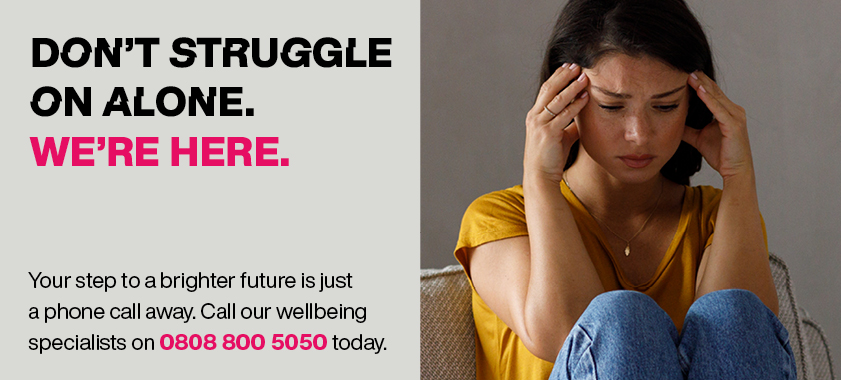Jump straight to the information you need

More support
More information on different mental health issues, and getting support with these
Why is wellbeing important in epilepsy?
Everyone feels low from time to time. But living with a long-term condition like epilepsy can make things even harder to deal with. People with epilepsy are at a higher risk of mental health problems like stress, anxiety or depression. Having low self-esteem due to epilepsy can also have a big impact on mental wellbeing.
There’s evidence that this link may work the other way around too. Mental health problems may make your epilepsy worse. Stress is thought to be a seizure trigger for many people.
This makes it especially important to look after your mental wellbeing. Not only will it help you to cope and feel happier living with epilepsy. But it may have a beneficial effect on your epilepsy too.
Mind and body
Your moods and emotions are closely related to your physical health. Looking after your physical health can have a positive impact on your mental wellbeing.
These tips may help you feel better both physically and mentally.
-
Eat a healthy, balanced diet
What you eat can affect your mood and your energy levels. This may be especially important if you’re living with epilepsy. Aim for a healthy diet with wholegrain foods, proteins and plenty of fruit and veg.
For some people with epilepsy, it may also be important to eat regularly. Some people with epilepsy say that if they skip meals, they are more likely to have a seizure.
-
Get active
Exercise can give your mental health a boost and help you to feel less stressed.
This alone may reduce your risk of having a seizure. There is also some evidence that physical activity may have a direct effect in the brain, which could reduce the risk of seizures.
-
Limit how much alcohol you drink
If you’re feeling low or stressed, drinking alcohol can make you feel worse. Not only that, but drinking large amounts over a short space of time can make you more likely to have a seizure. Drinking small or modest amounts doesn’t seem to increase the risk of having seizures.
Drinking to excess can also make some epilepsy medicines not work as well.
- Have a good sleep routine
Learn more about epilepsy and wellbeing
Our free wellbeing course provides more information about wellbeing and epilepsy, and tips you can try.
Taking control of your seizures
Getting the best possible control of your seizures will improve how well you feel and how you function in your daily life. So, as well as looking after your general health, these other things could also help.
Your epilepsy medicine
Taking your medicine as prescribed is one of the most important things you can do to keep your seizures under control. Missing a dose can increase your risk of having a seizure. Many people with epilepsy do not take their medicine properly. And many people don’t realise they are missing doses.
Here are some helpful tips for taking your medicine:
- Re-order your medicines in plenty of time to make sure you never run out
- If you’re going away, take more medicine with you than you think you’ll need. We have more travel advice for people with epilepsy
- Ask your epilepsy specialist or epilepsy nurse in advance what you should do if you ever forget to take your epilepsy medicine
- Set a reminder on your phone to take your medicine. If you have a smartphone, you could download a medicine reminder app
- Try a pill organiser (sometimes called a dosette box). These keep your medicines organised and may help you to take the right ones at the right time. You can buy them online or from a pharmacy. Some have an alarm that alerts you when it’s time to take your medicine
- Try to link taking your medicine to a particular time, place and routine activity. For example, taking your morning tablets in the bathroom, at 7am when you brush your teeth. Writing this down and reading it back to yourself can help to form an ‘automatic’ reminder in your memory
- Talk to your doctor before stopping your epilepsy medicine or changing how you take it
- Your doctor could also check whether there are any other medicines you could swap to, that you take less often
Recognise and avoid your seizure triggers
Some things make seizures more likely for some people with epilepsy. These are often called ‘triggers’. Here are some common triggers:
- Missing doses of epilepsy medicine
- Not getting enough sleep
- Feeling stressed
- Drinking too much alcohol
Keeping a diary of your seizures can help you to identify things that may trigger your seizures. Make a note of what you were doing or how you were feeling before each seizure. This can help to see if there are any patterns.
Avoiding your triggers can lower the risk that you’ll have a seizure.
Get the best treatment for your epilepsy
Our epilepsy treatment page can tell you more about how often you should have medical review. For a lot of people this will be at least once a year. This could be with your GP or with an epilepsy specialist. You might see an epilepsy specialist nurse more often if you’re still having seizures. If you normally see your GP about your epilepsy but you’re having seizures, ask them to refer you to a specialist.
If your seizures are very difficult to control, you may be seen at a specialist epilepsy centre. They can look again at your diagnosis and epilepsy medicines. They will also make sure you are getting the best treatment for you and talk to you about any other possible options, such as vagus nerve stimulation (VNS), the ketogenic diet, or epilepsy surgery.
Wellbeing tips for everybody
There are lots of other things you can do to improve your wellbeing and give your mental health a boost. These could be helpful for anyone, not just people with epilepsy. But if you do have epilepsy, it’s even more important to look after your mental health. Here are some of our top tips.
- Make time for things you enjoy. It might be watching a film, doing a hobby or reading a book
- Connect with others. This could mean talking to a friend, partner or family member. It can also help to build up connections in your community
- Epilepsy Action also has Talk and Support groups and 1:1 Peer Support that can help you meet others affected by epilepsy
- Find ways to relax. You might enjoy going for a walk or listening to music. Or try some breathing exercises to help with this
- Live in the present moment. Take notice of your surroundings and how you feel. You could practice mindfulness techniques too, which help you to do this
- Learn a new skill or set yourself a challenge. It can keep your mind focused and give you confidence and a sense of achievement. It can give your self-esteem a boost too.
- Spend time outdoors. This can improve your mood, especially if you are also being active
- Give something back. Volunteering or even just doing small acts to help others can have a positive effect on your mental wellbeing
Doing all these things would be too much for a lot of people. But even if you just try one of these suggestions, it could help improve your wellbeing.
Finally, if you’re struggling with your mental health, it’s important to know professional mental health support is available.
-
Sources
Mind (2023). How to improve your mental wellbeing. Available at: https://www.mind.org.uk/information-support/tips-for-everyday-living/wellbeing/ (Accessed: 16 October 2023)
SIGN (2018). Diagnosis and management of epilepsy in adults. SIGN 143. Available at: https://www.sign.ac.uk/media/1079/sign143_2018.pdf (Accessed: 16 October 2023)
Michaelis, R. et al. (2020) ‘Psychological treatments for people with epilepsy’, Cochrane Database of Systematic Reviews, 8(8). Available at: https://doi.org/10.1002/14651858.cd012081.pub3
NHS (2023). Raising low self-esteem. Available at: https://www.nhs.uk/mental-health/self-help/tips-and-support/raise-low-self-esteem/ (Accessed 17 October 2023)
Kwong, K.L. et al. (2016) ‘Self-esteem in adolescents with epilepsy: Psychosocial and seizure-related correlates’, Epilepsy & Behavior, 63, pp. 118–122. Available at: https://doi.org/10.1016/j.yebeh.2016.07.032.
Balamurugan, E. et al. (2013) ‘Perceived trigger factors of seizures in persons with epilepsy’, Seizure, 22(9), pp. 743–747. Available at: https://doi.org/10.1016/j.seizure.2013.05.018.
Legg, K.T. and Newton, M. (2017) ‘Counselling adults who experience a first seizure’, Seizure, 49, pp. 64–68. Available at: https://doi.org/10.1016/j.seizure.2016.09.012.
Mind (2023). Food and mental health. Available at: https://www.mind.org.uk/information-support/tips-for-everyday-living/food-and-mental-health/ (Accessed: 16 October 2023)
Arida, R.M. (2021) ‘Physical exercise and seizure activity’, Biochimica et Biophysica Acta (BBA) – Molecular Basis of Disease, 1867(1), p. 165979. Available at: https://doi.org/10.1016/j.bbadis.2020.165979.
Leach, J.P., Mohanraj, R. and Borland, W. (2012) ‘Alcohol and drugs in epilepsy: Pathophysiology, presentation, possibilities, and prevention’, Epilepsia, 53(s4), pp. 48–57. Available at: https://doi.org/10.1111/j.1528-1167.2012.03613.x.
Al-Aqeel, S. et al. (2020) ‘Strategies for improving adherence to antiepileptic drug treatment in people with epilepsy’, Cochrane Database of Systematic Reviews, 10(10). Available at: https://doi.org/10.1002/14651858.cd008312.pub4.
Gidal, B.E. et al. (2021) ‘Use of extended-release and immediate-release anti-seizure medications with a long half-life to improve adherence in epilepsy: A guide for clinicians’, Epilepsy & Behavior, 120, p. 107993. Available at: https://doi.org/10.1016/j.yebeh.2021.107993.
Clinical Knowledge Summaries. NICE (2023). Epilepsy. Scenario: Routine epilepsy review. Available at: https://cks.nice.org.uk/topics/epilepsy/management/routine-epilepsy-review/ (Accessed: 17 October 2023)
NICE (2022). Epilepsies in children, young people and adults. 4.5 Monitoring and review. Available from: https://www.nice.org.uk/guidance/ng217/chapter/4-Principles-of-treatment-safety-monitoring-and-withdrawal#monitoring-and-review (Accessed: 17 October 2023)
New Economics Foundation (2011). Five ways to Wellbeing. New applications, new ways of thinking. Available from: https://neweconomics.org/uploads/files/d80eba95560c09605d_uzm6b1n6a.pdf (Accessed: 17 October 2023)
Support
The following organisations have more information on looking after your wellbeing.
Anxiety UK
Anxiety UK works to relieve and support those living with anxiety disorders by providing information, support and understanding through an extensive range of services, including therapy.
Helpline: 03444 775 774
British Association for Mindfulness Based Approaches (BAMBA)
The BAMBA website has an online search tool to find a mindfulness teacher near you.
Counselling Directory
The Counselling Directory website allows you to search for counsellors in your area. Also provides information about different types of counselling.
Every Mind Matters
NHS resource with a wide range of information about looking after your mental wellbeing.
Drinkaware
The Drinkaware website provides information about how alcohol can affect your health. It also explains how to get support if you think you may be drinking too much. Includes a tool to help you work out how many units you drink.
Mental Health Foundation
The Mental Health Foundation gives advice on improving mental health and addressing underlying causes of poor mental health. It also has an online mindfulness program for mental health, Be Mindful.
Mind
Mind is a leading mental health charity in England and Wales. It provides advice and support to empower anyone experiencing a mental health problem, including anxiety, depression and stress.
Infoline: 0300 123 3393
NHS – Live Well
The NHS website provides advice and information about healthy living for everyone.
Rethink Mental Illness
Rethink provide practical information and advice for people affected by a mental illness on issues such as different types of therapy, medicines and benefits.
Advice service: 0808 801 0525
Royal College of Psychiatrists
The College website provides information for patients relating to mental illnesses and mental health problems.
Samaritans
If you need someone to talk to, the Samaritans are there to listen and talk things through. They are available 24 hours a day, 365 days a year.
Helpline: 116 123
Give us a Shout
Free, confidential, 24/7 text messaging support service for anyone who is struggling to cope.
Text: 85258
Stress Management Society
The Stress Management Society is dedicated to helping people recognise and reduce stress.
Tel: 0203 142 8650
YoungMinds
UK charity supporting children and young people’s mental health. The website provides information and advice both for young people and their parents.
Got any questions?
Our expert advisors can help you with any questions you might have about wellbeing or anything else related to living with epilepsy.







